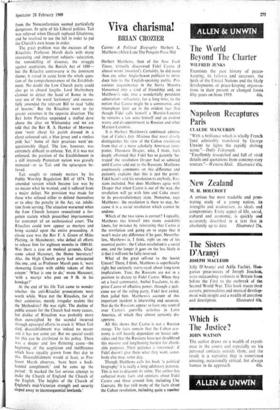Viva charisma!
BRIAN CROZIER
Castro: A Political Biography Herbert L. Matthews (Allen Lane The-Penguin Press 50s) Herbert Matthews, then of the New York Times, virtually discovered Fidel Castro (I
almost wrote 'invented'). Certainly, he did more than any other Anglo-Saxon publicist to intro- duce him to the English-speaking public. Pre- cocious acquaintance in the Sierra Maestra blossomed into a kind of friendship and, on Matthews's side, into a wonderfully persistent admiration—refractory, for a long time, to the notion that Castro might be a communist, and triumphant later on in the evident fact that though Fidel calls himself a Marxist-Leninist he remains a law unto himself and an evident worry and disappointment to Russian and other Marxist-Leninists.
It is Herbert Matthews's continued admira- tion of Cuba's fete Maximo that most clearly
distinguishes his view of the Cuban revolution
from that of a more scholarly American inter- preter, Theodore Draper, who, I think, feels
deeply affronted that Fidel has so patently 'be- trayed' the revolution Draper had so admired until Castro sold out to the Russians. Matthews courteously comments on this difference and patiently explains that this is just the point:
Fidel hasn't sold his revolution to anybody, Rus- sians included. Nor does Matthews agree with
Draper that when Castro is out of the way, the revolution will go with him and Cuba revert to its pre-revolutionary state. Nonsense, says
Matthews: the revolution is there to stay, be- cause it is a social revolution which cannot be undone.
Which of the two views is correct? Logically, Matthews ties himself into many avoidable
knots, for instance by reiterating that Castro is
the revolution and going on to argue that it won't make any difference if he goes. Neverthe-
less, Matthews is, I think, right on one of his essential points : the Cuban revolution is a social one, and the longer it goes on the less likely is it that it will ever be fully reversed.
What of the great sell-out to the Soviet Union? There, I think, Matthews is superficially right but curiously starry-eyed about long-term implications. True, the Russians are not in a position to dictate to Fidel Castro. When they set a local communist, Anibal Escalante, to de- prive Castro of effective power, through a judi- cious use of the ruling party, Fidel first exiled, then jailed him. Matthews's account of this important incident is interesting and accurate. Nor do the Russians appear to have any control over Castro's guerrilla activities in Latin America, of which they almost certainly dis- approve.
All this shows that Castro is not a Russian stooge. The facts remain that the Cuban eco- nomy is still heavily dependent on Soviet sub-
sidies and that the Russians have not shouldered this massive and lengthening burden for charit- able purposes. Their patience is renowned : if Fidel doesn't give them what they want, some- body else may, some day.
Though Matthews calls his book 'a political biography' it is really a long adulatory polemic. This is not to discount its value. The author has collected many facts and opinions about Fidel Castro and those around him, including Che Guevara. He has told many of the facts about the Cuban revolution, including quite a number of unfavourable ones. But his unbounded ad- miration nearly always clouds his judgment Thus he records Fidel's own misjudgments and Utopian naïveté, even—to some degree—his mismanagement. But all in the end is forgiven : the totalitarian press, the banning of strikes, the forced labour (labelled, it is true, 'voluntary'), the broken promises of land to the tillers, the failure of industrial diversification, the falling sugar output. None of these counts, it seems, be- cause vice and graft have gone and rents are being abolished.
There is a case for the view that Fidel Castro is, more than anything else, a prodigiously ener- getic windbag. But Herbert Matthews doesn't see it that way : in his Cuba, charisma is all.



































 Previous page
Previous page